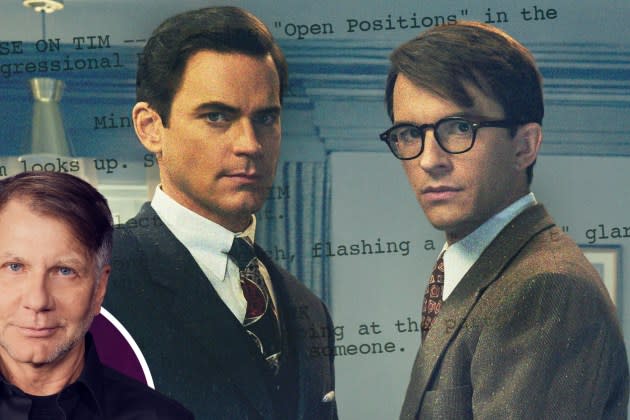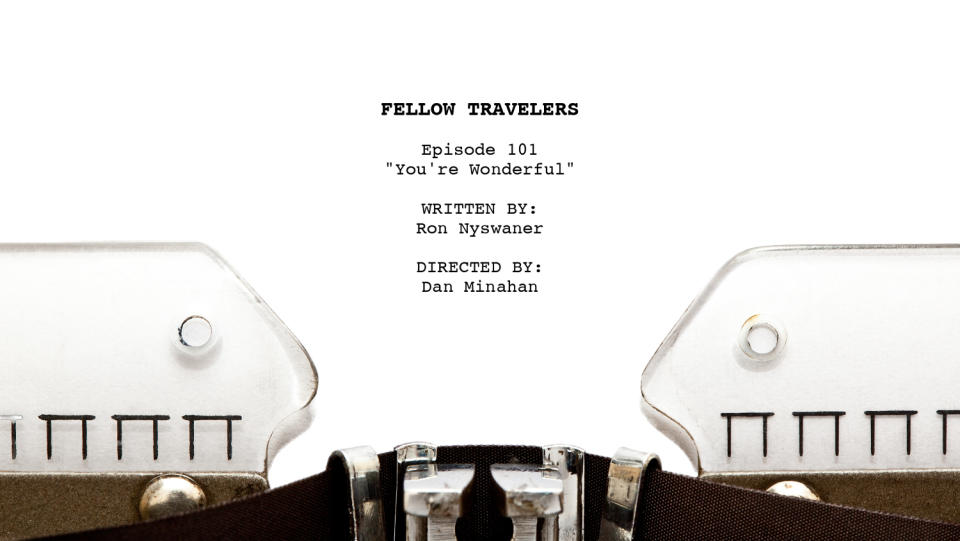It Starts On The Page: Read ‘Fellow Travelers’ Premiere Script “You’re Wonderful” By Ron Nyswaner

Editor’s note: Deadline’s It Starts on the Page features standout limited or anthology series scripts in 2024 Emmy contention.
Ron Nyswaner has written movies for more than four decades, earning an Oscar nomination for Philadelphia, and has worked on shows like Homeland and Ray Donovan. He made his debut as a TV creator with Showtime’s limited series Fellow Travelers, a sweeping and tragic love story of two gay men, played by Matt Bomer and Jonathan Bailey, who start a forbidden romance in McCarthy-era Washington DC.
More from Deadline
It Starts On The Page: Read 'Baby Reindeer' Episode 4 Script By Richard Gadd
Patrick Dempsey Joins 'Dexter: Original Sin' In Series Regular Role
It Starts On The Page: Read 'The Regime' Finale Script "Don't Yet Rejoice" By Will Tracy
In the forward to his script for the premiere, “You’re Wonderful,” Nyswaner reveals the questions planted in the episode, directed by Daniel Minahan, as well as the central question of the series.
He talks about the long journey to adapt Thomas Mallon’s 2007 novel and addresses changes he made to the book, including introducing Black characters and expanding the 1950s setting to have the story continue through the 1960s, 1970s and 1980s.
I spent eleven years creating a television series based on the love story presented in Thomas Mallon’s beautiful novel, Fellow Travelers. I was drawn to the book’s heroes: Hawkins Fuller and Tim Laughlin, two vastly different men conducting a passionate affair in 1950’s Washington DC, during the government’s crusade against homosexual employees. This was a love story with high stakes.
Early in the process, I decided to expand the novel’s scope beyond the five years covered in the book. I would try to create an epic love story covering significant events in LGBTQ history, incorporating my personal experiences as a gay man coming of age in the second half of the twentieth century. We would move beyond the McCarthy era to the anti-Vietnam War protests of the 1960s, the joyful hedonism of the 1970s, the 1979 murders of Harvey Milk and George Moscone and the outrage that followed. The show would reach its climax in the 1980s, with the AIDS crisis, an event that profoundly shaped my life. Rather than tell the story chronologically, we would attempt an adventurous narrative approach.
All these elements would be introduced – at least, planted — in the pilot, including the time-shifting structure.
Additionally, I had to solve a problem posed by my central character: Hawk is remote and guarded, making decisions that are cold-hearted, even cruel. He betrays a sexual partner, blackmails a politician, lies to his wife, and rebuffs Tim’s affection. How do I invite the audience to align themselves with him?
I decided to give Hawk a backstory concerning his love for a sensitive teenager; Hawk blames himself for the young man’s death. And I introduced significant new characters to display Hawk’s softer side: Senator Smith and his daughter, Lucy.
Hawk is devoted to Smith (based on real-life Senator Lester Hunt). When Joseph McCarthy and Roy Cohn target the liberal Senator, Hawk takes steps to destroy them, becoming an unlikely hero. This construction has the added advantage of placing Hawk at the center of the 1950s plot (in the book, Hawk was an observer of this plot).
To further illustrate Hawk’s basic decency, the pilot establishes him as a supportive husband and loving grandfather, struggling to reconcile his past with his commitment to his family. In 1986, while packing for a brief trip to see Tim, he assures Lucy: “You’re everything to me.” Her retort establishes the essential conflict of their marriage: “If I was everything, you wouldn’t be going where you’re going.”
In contrast to Hawk, Tim is a raw nerve of emotion: he can’t hide his passion for McCarthy, God, or Hawk. As McCarthy is reviled today, I worried the audience would be put off by Tim’s admiration for the disgraced senator. To address this challenge, I expanded Tim’s belief system beyond McCarthy’s anti-communism cause. Tim wants to “do something good in the world.” He seeks to believe in something bigger than McCarthy and bigger than himself.
In the pilot, Hawk’s and Tim’s differences are positioned as a conflict between opposing world views. Hawk believes in pleasure and survival. Tim believes in sacrifice and serving a higher purpose. This broader conflict invites the audience to engage with the characters at a deeper level, beyond the confines of a typical romance. This conflict becomes the thematic glue that holds the show together, as Hawk and Tim rehash versions of this argument for three and a half decades.
Another challenge: there were no Black characters in the novel. I believed it was important – and good drama — to include characters of color. In the pilot, I introduce Marcus and Frankie, created for the show and inspired by historical figures. Their story expands as the series moves forward; they are among the five leading characters we follow through the show’s multiple eras.
The questions planted in the pilot about Hawk, Tim, Marcus, Frankie, and Lucy are the essential questions that drive the series. What does Hawk really care about? How will Tim reconcile his faith with his passion for Hawk? What does Lucy know about Hawk’s secret life? How will Marcus survive in a racist world with the odds stacked against him? How long will Frankie tolerate Marcus’ unwillingness to commit to a relationship with another man?
By posing these questions to the audience, I’m inviting them to ponder the central question of the series: What is the price paid by those who are forced to deny themselves love and bury the part of themselves that is loving?
Click below to read the script.
Best of Deadline
Sign up for Deadline's Newsletter. For the latest news, follow us on Facebook, Twitter, and Instagram.



